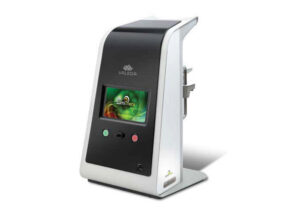Condition
Age-related Macular Degeneration (AMD) is the leading cause of vision loss and blindness in Americans ages 65 and older. The condition occurs when the macula, which is the part of the retina responsible for the sharp, central vision needed to read or drive, deteriorates. Because the macula primarily is affected in AMD, central vision loss may occur. There are two forms of AMD: wet and dry. Patients with wet AMD develop new blood vessels under the retina. This causes hemorrhages, swelling, and scar tissue. Dry AMD is much more common and is characterized by drusen (small, yellowish deposits) and loss of pigment in the retina.

Risk factors include:
- Heredity
- smoking
- blue eyes
- high blood pressure
- cardiovascular disease
Prevalence
1.75 million U.S. residents have advanced age-related macular degeneration. The number of cases is expected to rise to almost 3 million by 2020.
Symptoms

Macular degeneration usually produces a slow, or rarely, sudden painless loss of vision. Early signs of vision loss from AMD include shadowy areas in your central vision or unusually fuzzy or distorted vision. Retinal exams can detect early signs of macular degeneration before symptoms occur. When macular degeneration is suspected, a brief test to measure your central vision may be performed.
Treatment
Eye Center of Hawaii is proud to be the first and only provider on the Big Island to offer the first and only treatment for dry age-related macular degeneration that can improve vision!
✓ SAFE ✓ EFFECTIVE ✓ COMFORTABLE ✓ FDA-APPROVED

How Valeda Works
Valeda delivers photobiomodulation (PBM), a form of low-level light therapy that uses targeted wavelengths of light to boost cellular energy within the eye. By enhancing the function of retinal cells, Valeda supports healthier tissue—an essential part of maintaining strong, dependable vision.
Patients using Valeda may experience clearer vision both now and over time. Imaging of the retina has shown positive changes, including reductions in drusen, the protein deposits commonly associated with dry age-related macular degeneration (AMD).
What to Expect During Valeda Therapy
Valeda sessions are simple, gentle, and designed with your comfort in mind. The treatment does not involve eye drops, medications, or injections, and patients generally report no discomfort during or after the procedure. You’ll sit comfortably at the Valeda device while the team walks you through each step.
Each session lasts less than five minutes per eye. A full treatment series includes nine sessions, typically scheduled over a period of three to five weeks. Most patients repeat a series about every four months, though your eye doctor will recommend the schedule that best fits your needs.
After Your Session
Some patients notice a temporary afterimage from the bright light used during treatment. This effect—called photostress—usually fades within 15–30 seconds. Once your appointment is complete, you can return to your normal routine right away.
Wet AMD Options
Currently, Eye Center of Hawaii is excepting enrollment for a clinical trial, which seeks a new care option for wet AMD. NeoVista’s Novel Wet AMD Therapy includes a one-time treatment of a targeted dose of beta radiation to leaking blood vessels and two injections of anti-vascular endothelial growth factor. Other treatment options for wet AMD are also available.



Lunar New Year is a time for fresh starts and bright possibilities. 🧧
As we welcome the new year, we’re honored to help our patients begin it with healthy vision and clear sight—today and all year long.
Happy Lunar New Year from our ʻohana to yours. ... See MoreSee Less
0 CommentsComment on Facebook
Your eyes do so much for you every day — this February, show them some love. 💖
Caring for your eyes helps protect your independence, confidence, and quality of life.
If you are experiencing dry eye, time for your annual exam, need a glaucoma screening or it's time for cataract surgery, we are here for you! ... See MoreSee Less
0 CommentsComment on Facebook
The right time for cataract surgery depends on how much your cataracts are affecting your daily life—not just what they look like on an exam.
You may be ready for surgery if you’re experiencing:
• Blurry or cloudy vision
• Difficulty driving, especially at night
• Trouble reading or seeing screens
• Glare or halos around lights
• Colors that look faded
Today’s cataract surgery is safe, advanced, and customizable—with laser cataract surgery, we can restore clarity and even reduce your need for glasses.
If your vision is interfering with the things you love, it may be time to explore your options. 👁️✨ ... See MoreSee Less
0 CommentsComment on Facebook
Your annual eye exam is not only good for your eye health but can often be the first to detect other health issues as well. If it's been over a year since you have had your eye exam, February is a great time to come in and see us!
Did you know we have a new location in Kailua? ... See MoreSee Less
0 CommentsComment on Facebook
#TipTuesday
We want to ensure we are partners in your vision care. You can take steps to care for your vision, and we are here when you need us! ... See MoreSee Less
0 CommentsComment on Facebook
If you rely on eye drops all day and still feel dry, irritated, or gritty—there’s more we can do.
Dry eye is often caused by underlying issues like meibomian gland dysfunction or inflammation. That’s why we offer advanced dry eye treatments that go beyond drops to address the root cause and provide lasting relief.
Because real relief doesn't always come from a bottle. Call us today to schedule your exam. ... See MoreSee Less
0 CommentsComment on Facebook